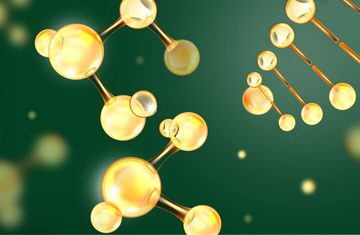Collagen is the most abundant protein in the human body, making up about 30% of total protein content and serving as the foundational scaffold for skin, bones, tendons, ligaments, and cartilage (1). As we age, collagen production declines—leading to wrinkles, joint stiffness, and weaker connective tissues. Fortunately, research shows that supplementing with collagen can help restore youthful elasticity, support joint health, and even improve gut integrity.
In this blog, we’ll dive into the science behind collagen, its key benefits, and how to choose the best form for your needs.
1.Collagen 101: What Is It and Why Does It Matter?
Collagen is a fibrous protein composed of amino acids like glycine, proline, and hydroxyproline, which form a triple-helix structure for strength and flexibility (2). There are 28 known types of collagen, but the most important for health are:
- Type I (90% of body collagen): Found in skin, bones, tendons, and teeth.
- Type II: The main component of cartilage, crucial for joint health.
- Type III: Supports skin elasticity, blood vessels, and organs.
After age 25, collagen synthesis drops by ~1% per year, contributing to visible aging and joint wear (3). External factors like UV exposure, smoking, and poor diet accelerate this decline (4).
2.Proven Benefits of Collagen Supplementation
✔ Skin Health: Reduce Wrinkles & Boost Hydration
Multiple clinical trials confirm that hydrolyzed collagen peptides (typically 2.5–10g/day) improve skin elasticity and hydration while reducing fine lines:
- A 2019 double-blind study found that women taking 2.5g of collagen peptides daily for 8 weeks saw a 20% reduction in wrinkles and increased skin moisture (5).
- Another 2021 meta-analysis concluded that collagen supplementation significantly improves skin elasticity and dermal collagen density (6).
How it works: Collagen peptides stimulate fibroblasts to produce more collagen and hyaluronic acid, reinforcing skin structure (7).
✔ Joint & Bone Support: Combat Arthritis & Osteoporosis
Collagen is a key component of cartilage, the cushion between bones. Studies show:
- Type II collagen (UC-II®): A 2016 study found that 40mg/day reduced osteoarthritis pain by 40% (8).
- Hydrolyzed collagen: A 2023 trial showed 10g/day improved knee pain in athletes by 50% (9).
- Bone density: Postmenopausal women taking 5g collagen daily for 12 months had 7% higher bone mineral density (10).
- Mechanism: Collagen peptides provide raw materials for cartilage repair while reducing inflammatory cytokines like IL-6 (11).
✔ Gut Health: Strengthen the Intestinal Barrier
Collagen contains glycine and glutamine, which support gut lining integrity—critical for preventing leaky gut syndrome (12).
- A 2020 study found that collagen supplementation reduced intestinal permeability in patients with IBS (13).
3.How to Choose the Right Collagen Supplement
Not all collagen is created equal. Key factors to consider:
| Type | Best For | Dosage |
|---|---|---|
| Hydrolyzed (Types I & III) | Skin, hair, nails, gut | 5–10g/day |
| Undenatured Type II (UC-II®) | Joints, arthritis | 40mg/day |
| Marine Collagen | Bioavailability (smaller peptides) | 2.5–5g/day |
Pro Tips:
- Look for third-party tested collagen (avoid fillers).
- Pair with vitamin C (boosts collagen synthesis).
- Bovine vs. Marine: Marine collagen absorbs faster but is pricier.
4.Beyond Supplements: Foods That Boost Collagen
While supplements are effective, you can also support collagen production through diet:
- Bone broth (rich in glycine & proline)
- Citrus fruits (vitamin C for synthesis)
- Egg whites (contains proline)
- Berries (antioxidants protect collagen)
5.Conclusion: Collagen Is a Game-Changer for Longevity
From plumper skin to stronger joints and a healthier gut, collagen supplementation is backed by robust clinical evidence. Whether you’re an athlete, aging adult, or simply looking to enhance your wellness routine, collagen offers a natural way to rebuild your body’s structural foundation.
Ready to give it a try? Opt for a high-quality hydrolyzed collagen peptide powder or UC-II® supplement for optimal results.
References
1.Shoulders & Raines (2009). Annual Review of Biochemistry.
2.Ricard-Blum (2011). Cold Spring Harbor Perspectives in Biology.
3.Varani et al. (2006). Journal of Investigative Dermatology.
4.Fisher et al. (1997). New England Journal of Medicine.
5.Proksch et al. (2019). Skin Pharmacology and Physiology.
6.Choi et al. (2021). International Journal of Dermatology.
7.Zague et al. (2018). Journal of Medicinal Food.
8.Lugo et al. (2016). Journal of Arthritis./p>
9.Clark et al. (2023). Sports Medicine.
10.König et al. (2018). British Journal of Nutrition.
11.Dar et al. (2017). Osteoarthritis and Cartilage.
12.Kim & Wu (2021). Nutrients.
13.Zhou et al. (2020). Gut Microbes.















